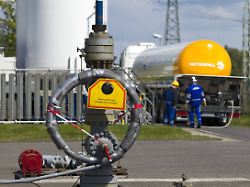Traffic light should present strategy
Union insists on underground CO2 storage
September 19, 2023, 4:53 a.m
Listen to article
This audio version was artificially generated. More info | Send feedback
While the Greens primarily want to avoid CO2 emissions when it comes to climate protection, the Union also relies on the underground storage of greenhouse gases. Scientists believe the risks are justifiable, but the Ministry of Economic Affairs has not yet provided a strategy.
In the debate about the underground storage of carbon dioxide, science and the opposition are pushing for more speed. Germany must make faster progress in implementing this technology, said geoscientist Klaus Wallmann from the Geomar Helmholtz Center for Ocean Research Kiel to the “Rheinische Post” with a view to the so-called carbon management strategy that is currently being developed in the Federal Ministry of Economics.
“It is now important that this strategy is actually adopted and implemented promptly. The first thing is to update the legal framework so that exports to Norway, Denmark and the Netherlands are made possible and CO2 storage locations in the German North Sea are explored allowed,” the scientist told the newspaper. The Carbon Dioxide Storage Act (KSpG) must then be updated so that CO2 can also be deposited and stored in Germany, emphasized Wallmann.
He considers the dangers of the so-called CCS technology (Carbon Capture and Storage) to be manageable. The risks have been intensively investigated in many scientific projects for decades. “It has been shown that the risks can be controlled if there is comprehensive monitoring and appropriate regulation. Then the benefit for climate protection is significantly higher than the environmental risk,” Wallmann told the paper. The goal of climate neutrality by 2045 cannot be achieved without negative emissions.
Greens fear that decarbonization will take priority
Pressure on the traffic lights also comes from the opposition. “We have to make progress on carbon dioxide capture because this is crucial for connecting climate protection and industry,” said CDU climate politician Andreas Jung to the “Rheinische Post”. Some emissions in industrial processes cannot be avoided, only captured, says Jung. “CCS and CCU (Carbon Capture and Utilization) are neither a replacement for consistent emissions reductions nor an extension of fossil energy. Rather, the technologies are the key to a climate-neutral industrialized country,” emphasized Jung. He further criticized: “Despite all the lip service, the traffic light has so far remained half-hearted: one step forward, one step back.”
The Greens, on the other hand, still have reservations about this technology. “Until we have initiated a real construction transition, we don’t need to talk about CCS in the cement industry. Real decarbonization needs to take priority over expensive and energy-consuming separation technologies. If that is not clear, the technology is damaging climate protection,” said Green climate politician Lisa Badum Newspaper. She is particularly critical of the storage of carbon dioxide under the German sea. “The North Sea is not a good place for a CO2 dump. That’s why it is crucial to keep the amount of CO2 to be captured small,” continued Badum. With the draft for the program for the 2024 European elections, the Green Party leadership made a U-turn on the CCS issue and initiated an opening for this technology.
